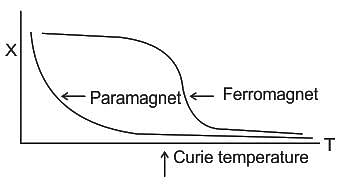Electrical Engineering (EE) Exam > Electrical Engineering (EE) Questions > When a ferromagnetic material is heated above...
Start Learning for Free
When a ferromagnetic material is heated above the curie temperature, it becomes:
- a)paramagnetic material
- b)non-magnetic material
- c)diamagnetic material
- d)strongly charged
Correct answer is option 'A'. Can you explain this answer?
| FREE This question is part of | Download PDF Attempt this Test |
Most Upvoted Answer
When a ferromagnetic material is heated above the curie temperature, i...
When ferromagnetic material heated beyond curie temperature, turns into paramagnetic material, as the ferromagnetic domains become random.
Curie temperature:
Curie temperature is the temperature at which the magnetic properties of a material change.
When the temperature is greater than the Curie temperature, ferromagnetic material becomes paramagnetic material. Here, X as (magnetic susceptibility) vs. T (temperature)

Attention Electrical Engineering (EE) Students!
To make sure you are not studying endlessly, EduRev has designed Electrical Engineering (EE) study material, with Structured Courses, Videos, & Test Series. Plus get personalized analysis, doubt solving and improvement plans to achieve a great score in Electrical Engineering (EE).

|
Explore Courses for Electrical Engineering (EE) exam
|

|
When a ferromagnetic material is heated above the curie temperature, it becomes:a)paramagnetic materialb)non-magnetic materialc)diamagnetic materiald)strongly chargedCorrect answer is option 'A'. Can you explain this answer?
Question Description
When a ferromagnetic material is heated above the curie temperature, it becomes:a)paramagnetic materialb)non-magnetic materialc)diamagnetic materiald)strongly chargedCorrect answer is option 'A'. Can you explain this answer? for Electrical Engineering (EE) 2024 is part of Electrical Engineering (EE) preparation. The Question and answers have been prepared according to the Electrical Engineering (EE) exam syllabus. Information about When a ferromagnetic material is heated above the curie temperature, it becomes:a)paramagnetic materialb)non-magnetic materialc)diamagnetic materiald)strongly chargedCorrect answer is option 'A'. Can you explain this answer? covers all topics & solutions for Electrical Engineering (EE) 2024 Exam. Find important definitions, questions, meanings, examples, exercises and tests below for When a ferromagnetic material is heated above the curie temperature, it becomes:a)paramagnetic materialb)non-magnetic materialc)diamagnetic materiald)strongly chargedCorrect answer is option 'A'. Can you explain this answer?.
When a ferromagnetic material is heated above the curie temperature, it becomes:a)paramagnetic materialb)non-magnetic materialc)diamagnetic materiald)strongly chargedCorrect answer is option 'A'. Can you explain this answer? for Electrical Engineering (EE) 2024 is part of Electrical Engineering (EE) preparation. The Question and answers have been prepared according to the Electrical Engineering (EE) exam syllabus. Information about When a ferromagnetic material is heated above the curie temperature, it becomes:a)paramagnetic materialb)non-magnetic materialc)diamagnetic materiald)strongly chargedCorrect answer is option 'A'. Can you explain this answer? covers all topics & solutions for Electrical Engineering (EE) 2024 Exam. Find important definitions, questions, meanings, examples, exercises and tests below for When a ferromagnetic material is heated above the curie temperature, it becomes:a)paramagnetic materialb)non-magnetic materialc)diamagnetic materiald)strongly chargedCorrect answer is option 'A'. Can you explain this answer?.
Solutions for When a ferromagnetic material is heated above the curie temperature, it becomes:a)paramagnetic materialb)non-magnetic materialc)diamagnetic materiald)strongly chargedCorrect answer is option 'A'. Can you explain this answer? in English & in Hindi are available as part of our courses for Electrical Engineering (EE).
Download more important topics, notes, lectures and mock test series for Electrical Engineering (EE) Exam by signing up for free.
Here you can find the meaning of When a ferromagnetic material is heated above the curie temperature, it becomes:a)paramagnetic materialb)non-magnetic materialc)diamagnetic materiald)strongly chargedCorrect answer is option 'A'. Can you explain this answer? defined & explained in the simplest way possible. Besides giving the explanation of
When a ferromagnetic material is heated above the curie temperature, it becomes:a)paramagnetic materialb)non-magnetic materialc)diamagnetic materiald)strongly chargedCorrect answer is option 'A'. Can you explain this answer?, a detailed solution for When a ferromagnetic material is heated above the curie temperature, it becomes:a)paramagnetic materialb)non-magnetic materialc)diamagnetic materiald)strongly chargedCorrect answer is option 'A'. Can you explain this answer? has been provided alongside types of When a ferromagnetic material is heated above the curie temperature, it becomes:a)paramagnetic materialb)non-magnetic materialc)diamagnetic materiald)strongly chargedCorrect answer is option 'A'. Can you explain this answer? theory, EduRev gives you an
ample number of questions to practice When a ferromagnetic material is heated above the curie temperature, it becomes:a)paramagnetic materialb)non-magnetic materialc)diamagnetic materiald)strongly chargedCorrect answer is option 'A'. Can you explain this answer? tests, examples and also practice Electrical Engineering (EE) tests.

|
Explore Courses for Electrical Engineering (EE) exam
|

|
Suggested Free Tests
Signup for Free!
Signup to see your scores go up within 7 days! Learn & Practice with 1000+ FREE Notes, Videos & Tests.






















